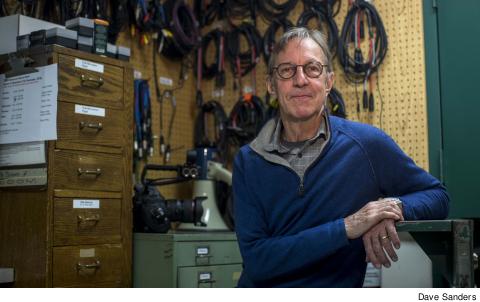How to make media for the people
 |
Martin Lucas is a professor of film and media at Hunter College. A videographer as well as an educator, his productions – which have appeared on television and other media – have covered a wide range of topics from the AIDS crisis to indigenous groups in Guatemala. A media-maker with a vision, he has worked with anti-war television and been involved with a variety of grassroots media organizations.
For the latest in an ongoing series of member interviews, Clarion recently spoke to Professor Lucas about his work.
Your first film, “Tighten Your Belts, Bite the Bullet,” was about the 1975 financial crisis. With inequality on people’s minds today, what lessons from that era inform the present moment?
I came to New York to go to school in 1975 and was struck immediately by this sense of a city in ruins. It was still a place that you could afford to move to and getting some kind of work wasn’t that hard, but the city was engaged in a policy of “planned shrinkage,” shutting down fire stations, hospitals, day care centers. Tuition was imposed at CUNY. People were fighting back, but with very limited success.
And then the banks took control of the city budget. At the time, my colleagues and I were documenting the beginning of what later became known as neo liberalism. Ordinary people’s lives were being made notably more difficult, while the dominant narrative was all about how the bankers, led by Felix Rohatyn of Lazard Freres, were “saving the city.” My sense is that today the neo liberal consensus is at an end, that we’re entering a new economic period, that the ’70s and ’80s suggest that working people will only get out of this current moment what they fight for.
You’ve seen technology in film and video change a lot over the years. Is it harder or easier to make independent media now?
On the technology side, making films is a thousand times easier. I have seen decent documentaries shot on cell phones. An example would be Behrouz Boochani’s Chauka, Please Tell Us the Time (2017), shot while Boochani was detained in a refugee camp in New Guinea. It was successful in exposing the conditions at Australian-run camps. And editing software comes with your laptop.
On the other hand, at least for independent media, there is not really a market, and it’s very hard to imagine making a living. Streaming is not really a source of income. Film festivals have gone online, and are flooded with entries. It reminds me a bit of what the music industry went through a few years ago with the death of the album.
The internet has been game- changing. How do you think unions and community groups can better use web-based film to spread their message?
As far as I am concerned, you can’t go wrong trying to represent your cause and your point of view in an audiovisual form. There are many ways to make effective media, and having a professional style is not necessarily the first component. As a kind of “thought experiment” I went on YouTube and searched for videos about the 2019 teachers’ strike in Chicago. Basically, all of the videos that come up were made by professional news organizations. Extensive scrolling showed one video by the AFT and no “unofficial” media at all. To me, there are missing voices there.
Ever since the FCC changed its rule on net neutrality, there’s been a general fear that the internet will be a less free forum than it has been. Do you see that? How can we fight it?
While the end of net neutrality is a threat, to me there are other issues that seem significant. One is that all of us are using a few privately owned social media platforms, platforms owned by the modern equivalent of the Golden Age robber barons. They may be more ethical as individuals, but the power equation is terribly out of balance.
The other thing is that new forms of power online are not always visible. Whether we’re talking about algorithms steering people to extremist content, or trolls drowning our belief in the possibility of finding real answers in a river of junk, the production and distribution of real information online is not easy. My sense is that the plus side for unions and community groups is that your online presence and your physical presence in the workplace or in your neighborhood can be mutually supportive.
What specific film and video projects are out there right now that you think progressive-minded people should look at?
We don’t really live in a shared media culture. For me, I find some things in places where they’re easy to find. Steven Soderbergh’s The Laundromat (2019) is readily available on Netflix. It will give you a surprisingly good sense of how dirty money works on a global scale in an easy-to-digest package. Other work I see in smaller contexts, either local places like UnionDocs in Williamsburg, which focuses on documentary, or at festivals.
One work I would recommend highly is The Prison in 12 Landscapes (2016), by Brett Story. The film looks at how the prison industry is built into the American scene in a way that really brings new understanding.
Another recent film I like, maybe because it hits on issues I teach, is Kirsten Johnson’s Cameraperson (2016).The film uses footage from films Johnson worked on as a cinematographer, mainly in situations of war or conflict, to explore the complex ethical issues that emerge when we make it our job to film other people. The other film I’d love to see is one that tackles the abandonment of public higher education by the state.
If you know someone who might be an interesting candidate for Clarion’s “Five Questions,” please send their information to the editor at [email protected].

